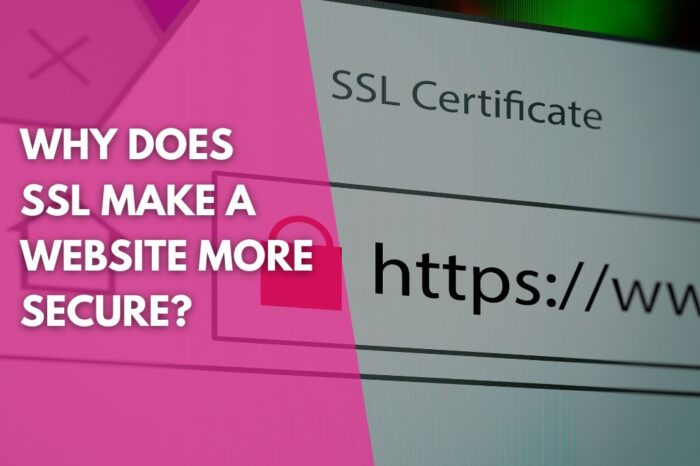If you find yourself browsing a website, you can determine if it’s using a trusted SSL certificate by looking at the website’s address within the browser address bar. But why does SSL make a website more secure?
SSL, or Secure Sockets Layer, is a security protocol that encrypts data transmitted between a user and a website. Securing a website using SSL ensures that any data shared is kept private.
In this article, I dig into topics like what is an SSL certificate, why SSL certificates are important and much more.

HTTP Versus HTTPS Website Address
The next time you browse a website, look at its address. If the address starts with HTTP, the website is not secure, and you should not continue to browse it.

If, on the other hand, the website address starts with HTTPS, it means that the website is using an SSL certificate, and it’s safe for you to browse.
Information you enter, such as your bank card details, social security number, or any other personal data, will be encrypted during transit and unreadable by any would-be hacker.
What Is An SSL Certificate And Why Is It Important For Websites?
An SSL certificate is a digital certificate that authenticates a website’s identity and encrypts data sent to its web server.

Firstly, before a website is issued an SSL certificate from a Certificate Authority (CA), a process of validation happens to ensure that the website applying for the certificate is who it says it is.
Secondly, once a website obtains and installs an SSL certificate, the certificate acts as a passport-like credential that a browser can use to establish a secure connection to the website you want to browse.
If you enter any data into a web form, and let’s face it, we all do! As soon as you click the submit button, there is a risk of data interception by a bad actor (hacker). This data could be anything from bank details, a personal email address, or even your social security number. Bad actors try to intercept this data for their gain, using a hack referred to as a man-in-the-middle attack.
Some browsers tell you that the website you’re about to browse does not support a secure connection. For example, the popular browser Chrome, has an option to automatically notify the user that they have reached a non-secure page.
We all use Google to search. You probably found this article by searching with Google. SSL is a component of Google’s search engine ranking algorithm. If comparing two websites with equivalent content, Google will promote and rank the website that has a valid SSL certificate higher in the search results page over the website that has not.
Google’s Chrome browser is the leader in the number of visual prompts that indicate if a website has a valid SSL certificate. To determine if the connection is safe, you need to check that the certificate has not expired. To do this, follow the steps below:
- Within the browser address bar tap the lock icon.
- Tap on the Connection is secure link.
- Tap on the Certificate is valid link.
- Using the Certificate Viewer, check the Validity Period dates.
How Do You Get An SSL Certificate?
Getting an SSL certificate is easy. Anyone can order an SSL certificate from a Certificate Authority. Alternatively, you can get a trusted certificate at zero cost from a non-profit Certificate Authority.
The first step for a website owner is to determine what type of certificate is needed since there are various options available. Depending on how the website is built, several certificates may be required if the website’s content is hosted on separate domains (web addresses).
The cost of an SSL certificate also varies. Some providers offer a certificate for free as part of their hosting plan. However, other hosting companies install the certificate for an additional fee if you don’t have the technical know-how. Check out this blog article if you want to learn more about how to install an SSL certificate.
What Types Of SSL Certificates Are There?
There are three types of SSL certificate authentication, Extended Validation (EV), Organization Validation (OV), and Domain Validation (DV).
Before buying an SSL certificate, understand that different types of SSL certificates available offer something different, and that difference is typically the level of authentication guaranteed by the CA. Let’s explore the three types below.
- Extended Validation (EV) – To obtain this level of certification requires certificate holders to undergo extensive vetting and identity background checks to ensure that their website is authentic and legitimate. Extended Validation certificates secure high-profile websites like banks.
- Organization Validation (OV) – To obtain this level of certification requires certificate holders to undergo much less vetting and identity background checks when compared to an Extended Validation certificate.
- Domain Validation (DV) – To obtain this level of certification requires that a company or person demonstrates ownership and control over the website domain for which they are applying. This is a no-frills, low-cost, encryption-only SSL certificate.
Frequently Asked Questions
Hopefully, I have answered all your questions on why does SSL make a website more secure. Below you’ll find a few additional SSL frequently asked questions, or check out my other article on internet safety for teens.
How does SSL affect website security?
Do you need an SSL certificate to enable HTTPS?
Why is HTTP not secure?
Final Thoughts On Why Does SSL Make A Website More Secure
So, in conclusion. Why does SSL make a website more secure? To determine if a website is safe to use, understanding if it has an SSL certificate and is using HTTPS will give you the answer. Knowing if a website is safe will help protect you from online scams.
